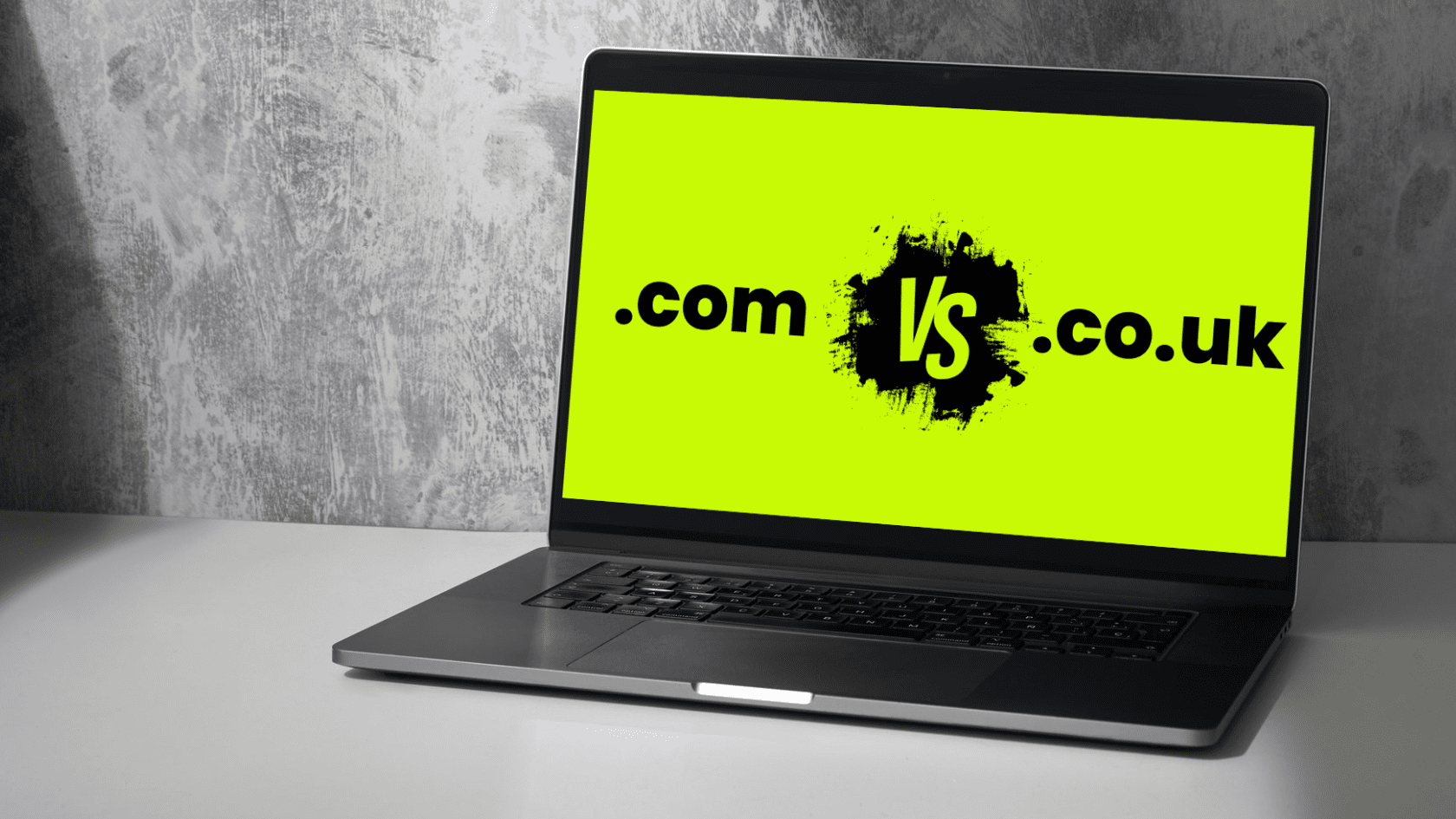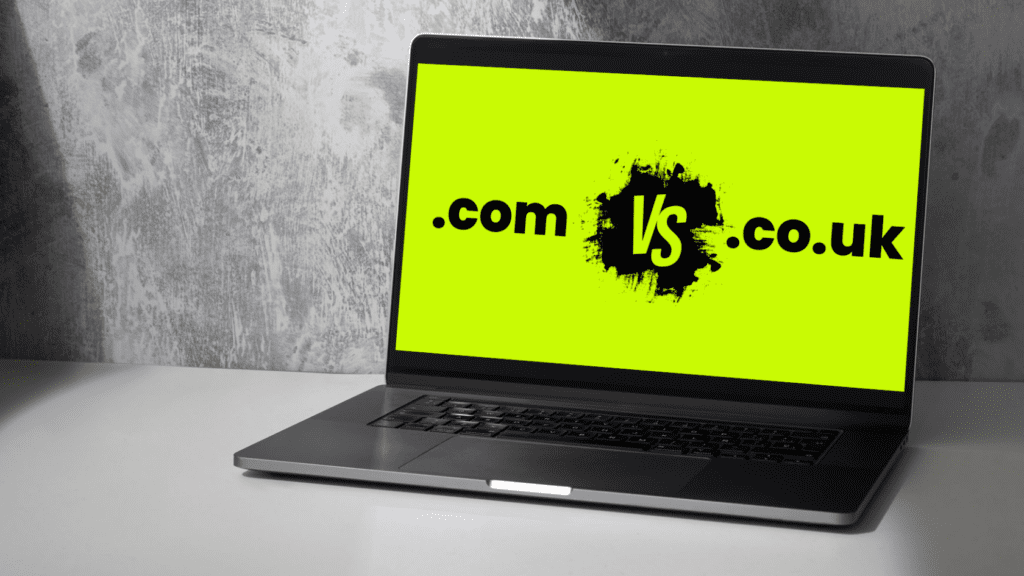When launching a new website, one of the pivotal decisions you’ll face is deciding between com or co.uk or perhaps another domain extension. This choice isn’t just about aesthetics or personal preference.
It is crucial to your website’s SEO strategy. In this insight, we’ll dive deep into the differences between the global appeal of a .com and the localised charm of a .co.uk, helping you decide which is the best fit for your business objectives.
com or co.uk Why Domain Choice Matters in SEO
Your domain extension can significantly influence how your website is perceived by both users and search engines. A .com domain is often regarded as the international standard, offering a broad, global reach.
On the other hand, a .co.uk extension can provide substantial geo-targeting benefits within the United Kingdom, making it ideal for businesses that primarily serve British customers.
What is a Domain Extension?
A domain extension forms the tail end of a domain name, representing the letters that follow after the final dot. Take, for example, our own URL: www.bitquirky.com. Here, ‘.com’ signifies our domain extension. Among over 1,000 top-level domains (TLDs), ‘.com’ remains the most prevalent choice. For businesses operating in the UK, selecting between a com or co uk domain extension involves a strategic evaluation of its advantages.
The ‘.com’ domain extension stands as the titan of TLDs. It is the most widely recognised and established, the first to reach widespread commercial use. This longevity and ubiquity lend it considerable authority and trust, which can be crucial for businesses aiming to project an international presence or appeal to a global audience.
Global vs Local: Understanding com or co.uk
Global Reach with .com: A .com domain suggests a universal presence. It can help establish your business as an international brand and is often used by companies aiming to reach a global audience. Moreover, .com domains are more familiar to users worldwide, potentially increasing user trust and engagement rates.
Local Impact with .co.uk: A .co.uk domain can be a strategic asset for businesses targeting a specifically British audience. It boosts SEO efforts focused on the UK market and signals to search engines that your content is particularly relevant to users in this region. Local domains like .co.uk can also enhance local search rankings and improve visibility among users seeking regional services.
How Search Engines View com and co uk
Search engines utilise domain extensions to determine a website’s relevance to a searcher’s query, especially when the query has local intent. Google, for instance, often gives an edge to localised domains like .co.uk for searches made within the UK, as it assumes these websites are more relevant to British users.
SEO Best Practices for Domain Selection
Choosing the right domain extension involves understanding your current audience and future business goals.
A .com domain might be the way to go if you aim to appeal to customers globally. However, if you foresee your business predominantly serving or expanding within the UK, a .co.uk could provide significant advantages regarding local SEO and user perception.
Key Considerations When Choosing .com or .co.uk
When deciding between a com or co uk domain, consider the following factors to align with your business needs and SEO goals:
Target Audience Location: A .co.uk domain can enhance your relevance in local search results if your primary audience is in the UK. A .com domain might serve you better for a global audience by not limiting your geographical reach.
Business Scalability: Think about where you see your business in the future. A .com domain offers more flexibility for global expansion, whereas a .co.uk domain might limit your business to the UK.
Brand Perception and Trust: Domains can also affect customer perception. A .com is often seen as more professional or established, while a .co.uk may convey a strong, local presence in the United Kingdom.

Case Studies: Successful Use of com and co.uk Domains
Global E-commerce Platform (using .com): An online retailer started with a .com domain to cater to a worldwide market. Their broad domain choice facilitated international reach and recognition, driving substantial traffic from various countries and contributing to a 50% increase in global sales within the first year.
UK-Based Consultancy Firm (using .co.uk): A consultancy focused solely on UK clients opted for a .co.uk domain. This decision improved their local search rankings, increased their client base by 35% in the first year, and enhanced engagement through regionally-targeted marketing campaigns.
The Rise of New Generic Top-Level Domains (gTLDs)
In recent years, introducing new generic top-level domains (gTLDs) has expanded the landscape of domain options beyond the traditional com or co uk. Domains like .shop, .tech, and .london allow businesses to create more customised and industry-specific online identities.
For instance, a tech startup might benefit from a .tech domain, which immediately communicates the industry focus to users. However, while these new gTLDs can enhance brand relevance and recognition, their impact on SEO is still evolving. Businesses must weigh their novelty and specificity against the universal acceptance and recognition of traditional extensions like .com.
Legal Considerations in Domain Selection
Choosing the right domain involves navigating both marketing and SEO considerations and legal aspects. It’s crucial to ensure that your chosen domain doesn’t infringe on existing trademarks, which could lead to legal challenges and force a costly change. Additionally, businesses should be aware of the risk of domain squatting, where individuals purchase domains of known brands to sell them at inflated prices.
Legal due diligence is recommended before finalising a domain choice to avoid potential conflicts and additional expenses.
Impact of Domain Extensions on User Behaviour
Different domain extensions can subtly influence user behaviour and perceptions. For example, a .com domain often conveys a sense of an established, global brand, which can increase user trust and potentially lead to higher click-through rates from international audiences.
Conversely, a .co.uk domain fosters greater trust among UK-based users, who prefer dealing with a locally recognised business.
Understanding these psychological impacts can be crucial in optimising conversion rates and tailoring marketing strategies to target specific customer demographics effectively.
Comparison Table: .com vs .co.uk Domains
A quick comparison can help clarify the key differences between .com and .co.uk domains and the impact each may have on SEO, brand perception, and audience targeting.
| Factor | .com | .co.uk |
| SEO Impact | Broad international appeal, neutral SEO impact globally |
Strong for UK-based SEO, signals relevance for UK users
|
| Audience Perception | Recognised worldwide, professional and credible on a global scale |
Often seen as more local and trustworthy within the UK
|
| Brand Credibility | Builds credibility internationally, especially for global brands |
Builds trust for UK-focused brands, showing local commitment
|
| Geographic Target | Best for businesses targeting a global audience |
Ideal for businesses focused primarily on the UK market
|
| Availability | High demand, popular for various industries, may be challenging to secure unique names |
Less competitive globally but in high demand within the UK, often easier to find available options
|
Domain Availability and Purchasing Strategy for com or co.uk
When choosing between .com and .co.uk, availability can be a deciding factor. Here’s how to approach domain purchasing strategically:
- Secure Both .com and .co.uk if Possible: Many businesses buy both versions to protect their brand and prevent competitors from using a similar name. If you want a global focus, consider using .com as your main domain and redirecting .co.uk to it—or the other way around if focusing on UK customers.
- Consider Future Expansion: Even if you’re UK-based, having the .com version gives you the flexibility to expand globally later without changing your domain. This approach allows you to build brand recognition on a domain that can grow with your business.
This dual-domain strategy provides flexibility and brand protection, ensuring that your business has room to grow and adapt.

SEO Best Practices for Local and Global Audiences
Whether you choose .com or .co.uk, optimising for SEO requires a strategy that aligns with your target audience’s location and search behaviour. Here are some SEO tips for both local and international reach:
- For .co.uk Domains: Focus on local SEO practices, such as targeting location-specific keywords (e.g., “London florists” or “Manchester SEO services”) and creating content relevant to UK customers. Also, set your geographic target to the UK in Google Search Console to enhance visibility in local searches.
- For .com Domains: If targeting a global audience, use broader keywords that appeal across regions. Avoid overly localised language unless it serves a specific market segment. Setting a global target in Search Console can help reach an international audience more effectively.
These strategies help ensure your domain, whether .com or .co.uk, maximises its reach and relevance.
.com or co.uk FAQs
Does a .com domain rank better internationally?
Yes, a .com domain generally holds more global authority and is more likely to perform well internationally compared to country-specific TLDs.
How does a .co.uk domain impact SEO in the UK?
A .co.uk domain provides strong local signalling to search engines, making it more likely to rank well for searches originating in the UK, especially for local services and products.
Can I use both com or co.uk domains together?
Yes, you can use both if your business targets global and UK-specific audiences. Redirecting one to the other or using a country-specific subdirectory can effectively manage local and international content.
Common Mistakes to Avoid in Choosing .com or .co.uk
Choosing the right domain is critical, and avoiding common pitfalls can help you make the most of your choice. Here are a few mistakes to steer clear of:
- Neglecting Local SEO with a .com Domain: If your primary audience is UK-based and you opt for .com, you’ll need to work a bit harder on local SEO to ensure you rank well in UK searches. Target UK-specific keywords and set your geographic target to the UK in Google Search Console.
- Failing to Secure Both Domains: If possible, secure both com and .co.uk to prevent competitors from using a similar domain and potentially diverting your traffic. Redirect one domain to the other to keep things consistent.
- Ignoring Future Expansion Plans: If there’s a chance your business will expand internationally, consider the .com domain from the outset. Switching from .co.uk to .com later can be costly and may impact SEO performance in the short term.
Avoiding these mistakes ensures that your domain choice supports your long-term goals, whether local or global.
When to Choose .com vs .co.uk
Choosing between .com and .co.uk depends on your brand’s goals, target audience, and long-term strategy. Here are a few common scenarios to help decide:
- UK-Only Business: If your business serves only the UK market, such as a local retailer, using .co.uk shows you’re committed to the UK audience, helping to build local credibility and trust.
- Brand with Global Ambitions: For companies aiming to reach international markets, especially if you plan to expand beyond the UK, .com is a great choice. It’s recognised globally and appeals to a wider audience, making it a suitable domain as your brand grows.
- Expanding from the UK to Global: If you’re initially UK-focused but may expand internationally, you might choose .com or .co.uk. However, start with .co.uk and secure the .com for future expansion, redirecting it to the main domain until ready to go global.
Consideration of Other TLDs Beyond com or .co.uk
While com or co.uk are the most common choices, other top-level domains (TLDs) might be suitable for your brand, depending on your industry or target audience. Here’s a brief overview of additional TLDs to consider:
- .net: Often used by tech and network-based companies, .net can be a good fallback if .com is unavailable, though it’s less recognisable globally.
- .org: Commonly used by non-profits and organisations, .org can signal trustworthiness, though it’s less suitable for commercial brands.
- .uk: Similar to .co.uk, but with a slightly broader appeal. It’s still UK-focused but can feel more modern, appealing to a younger audience.
- Newer TLDs (e.g., .io, .shop, .agency): Industry-specific TLDs like .io (often used by tech startups) or .shop (for e-commerce) can help position your brand uniquely, though they’re less recognisable than .com or .co.uk.
Final Thoughts: .com or co.uk?
Choosing the right domain extension, .com or .co.uk, is not just a technical decision; it’s a strategic one that can significantly impact your website’s visibility and engagement. Here’s a recap of what you need to consider:
- Global Reach vs. Local Focus: If your ambition is to attract a worldwide audience, the .com domain is likely your best bet due to its universal recognition and broader appeal. However, if your primary market is the UK, or if you aim to present your brand as distinctly British, a .co.uk domain can give you a considerable advantage in local search rankings and user trust within the region.
- SEO Implications: Search engines adapt their results to best fit the searcher’s context, and domain extensions play a part in this process. A .com domain generally fares better globally, while a .co.uk domain can boost your SEO efforts and visibility for UK-specific queries.
- Brand Perception: Choosing between these domains also reflects your brand’s identity. A .com conveys a more international, established business presence, whereas a .co.uk is clearly aligned with local, culturally nuanced branding that resonates deeply with a UK audience.
- Future Scalability: Consider where you see your business in the coming years. A .com offers more flexibility for global expansion without needing to rebrand. At the same time, A .co.uk might only limit your perceived relevance outside the UK if you adopt additional domains or subdomains to cater to other markets.
Given these points, your business’s target demographic, marketing strategy, and long-term goals should guide your decision between a com or .co.uk domain. Each domain has its strengths, and the right choice depends on aligning those strengths with your business objectives and your audience’s needs.
Pros and Cons: .com vs .co.uk
Choosing a com or co.uk domain is a significant decision for your business. If you still can’t decide here’s a quick overview of the pros and cons to help you determine which option best aligns with your goals:
.com Domain Pros:
- Global Reach: Recognised worldwide, ideal for businesses with international ambitions.
- Brand Credibility: Seen as trustworthy and professional on a global scale.
- Broad SEO Appeal: Suitable for targeting an international audience and multiple markets.
.com Domain Cons:
- Highly Competitive: Many names are taken, which can make it harder to secure a unique, memorable domain.
- Neutral for Local SEO: Doesn’t offer the same local SEO advantage for UK-based searches as .co.uk.
.co.uk Domain Pros:
- Local SEO Advantage: Favoured by search engines for UK-based searches, helping you reach a local audience effectively.
- UK Brand Recognition: Signals to customers that your business is UK-focused, which can build trust with local consumers.
- Availability: Often easier to find available domain names in .co.uk than .com.
.co.uk Domain Cons:
- Perceived Limited Reach: May not be ideal for businesses with global ambitions, as it signals a UK-specific focus.
- Brand Expansion: If your business plans to expand internationally, you may need to secure a .com later on, which could be costly.
This breakdown hopefully helps clarify which domain best fits your brand’s goals, whether you’re looking to build local trust or reach an international audience.

Still can’t decide on com or co.uk?
Not sure which domain is the best fit for your business? We can help!
Choosing a .com or .co.uk domain can have a lasting impact on your brand’s reach and search engine performance. At BQC, we specialise in SEO audits and growth strategies that align with your business goals and target audience.
Get in touch for a free SEO consultation, and let’s explore how the right domain choice and SEO strategy can drive your business forward. Click here to schedule your consultation!






